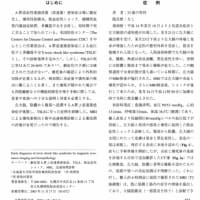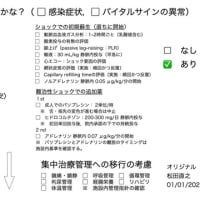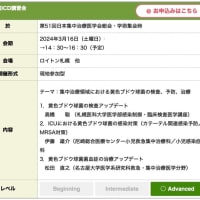敗血症は大量のサイトカイン産生病態であり,蛋白と脂質の異化を基盤とします。
このために炎症の急性極期を含めて栄養管理が極めて大切なのですが,
多くの施設では,急性期栄養管理が不十分で痩せや意識障害が進行してしまったり,
さらに腸管炎症の軽減についての十分な対応,すなわち早期経腸栄養が行われていないようです。
本日の朝の討論は,バクテリアルトランスロケーションと腸管由来敗血症の違い,
そして腸管傍リンパ節装置における炎症進展の機序でしたが,
この内容は今後,より厳密に評価されるものであり,
まだまだ,この病態生理の詳細は発展途上にあると考えています。

Surgeon. 2012 Apr 23. [Epub ahead of print]
Gut-origin sepsis: Evolution of a concept.
Deitch EA.
Department of Surgery, University of Medicine and Dentistry New Jersey, Newark, New Jersey, USA.
Abstract
The concept of bacterial translocation and gut-origin sepsis as a cause of systemic infectious complications and the multiple organ dysfunction syndrome (MODS) in surgical and ICU patients has emerged over the last several decades, although the exact clinical relevance of these phenomenon continue to be debated. Thus, the goal of this review will be to trace the evolution of gut-origin sepsis and gut-induced MODS and put these disorders and observations into clinical perspective. Additionally, the mechanisms leading to gut-derived complications will be explored as well as therapeutic options to limit or prevent these complications. From this work, several major conclusions emerge. First, that bacterial translocation occurs clinically and is responsible for increased infectious complications in patients undergoing major abdominal surgery. However, the phenomenon of bacterial translocation is not sufficient to explain the development of MODS in ICU patients. Instead, the development of MODS in these high-risk patients is likely due to gut injury and the systemic spread of non-microbial, tissue-injurious factors that reach the systemic circulation via the intestinal lymphatics. These observations have resulted in the gut-lymph hypothesis of MODS.
Ann N Y Acad Sci. 2010 Oct;1207 Suppl 1:E103-11.
Gut lymph and lymphatics: a source of factors leading to organ injury and dysfunction.
Deitch EA.
Abstract
Major trauma, shock, sepsis, and other conditions can lead to the acute respiratory distress syndrome (ARDS), which may progress to the highly lethal multiple organ dysfunction syndrome (MODS). Although a number of therapeutic strategies have been initiated, their success has been limited largely due to an incomplete understanding of the biology of MODS. However, recent studies indicate that the intestinal lymphatics serve as the primary route for nonbacterial, tissue injurious gut-derived factors, which can induce acute ARDS and MODS. The gut lymph hypothesis of ARDS and MODS thus helps clarify several important issues. First, because the lung is the first organ exposed to mesenteric lymph and not the liver (i.e., mesenteric lymph enters the subclavian vein via the thoracic duct, which, in turn, empties directly into the heart and lungs), it would explain the clinical observation that the lung is generally the first organ to fail. Second, this hypothesis provides new pathophysiologic information, thereby providing a basis for novel therapies. Finally, by studying the composition of lymph, MODS-inducing factors can be isolated and identified.

このために炎症の急性極期を含めて栄養管理が極めて大切なのですが,
多くの施設では,急性期栄養管理が不十分で痩せや意識障害が進行してしまったり,
さらに腸管炎症の軽減についての十分な対応,すなわち早期経腸栄養が行われていないようです。
本日の朝の討論は,バクテリアルトランスロケーションと腸管由来敗血症の違い,
そして腸管傍リンパ節装置における炎症進展の機序でしたが,
この内容は今後,より厳密に評価されるものであり,
まだまだ,この病態生理の詳細は発展途上にあると考えています。

Surgeon. 2012 Apr 23. [Epub ahead of print]
Gut-origin sepsis: Evolution of a concept.
Deitch EA.
Department of Surgery, University of Medicine and Dentistry New Jersey, Newark, New Jersey, USA.
Abstract
The concept of bacterial translocation and gut-origin sepsis as a cause of systemic infectious complications and the multiple organ dysfunction syndrome (MODS) in surgical and ICU patients has emerged over the last several decades, although the exact clinical relevance of these phenomenon continue to be debated. Thus, the goal of this review will be to trace the evolution of gut-origin sepsis and gut-induced MODS and put these disorders and observations into clinical perspective. Additionally, the mechanisms leading to gut-derived complications will be explored as well as therapeutic options to limit or prevent these complications. From this work, several major conclusions emerge. First, that bacterial translocation occurs clinically and is responsible for increased infectious complications in patients undergoing major abdominal surgery. However, the phenomenon of bacterial translocation is not sufficient to explain the development of MODS in ICU patients. Instead, the development of MODS in these high-risk patients is likely due to gut injury and the systemic spread of non-microbial, tissue-injurious factors that reach the systemic circulation via the intestinal lymphatics. These observations have resulted in the gut-lymph hypothesis of MODS.
Ann N Y Acad Sci. 2010 Oct;1207 Suppl 1:E103-11.
Gut lymph and lymphatics: a source of factors leading to organ injury and dysfunction.
Deitch EA.
Abstract
Major trauma, shock, sepsis, and other conditions can lead to the acute respiratory distress syndrome (ARDS), which may progress to the highly lethal multiple organ dysfunction syndrome (MODS). Although a number of therapeutic strategies have been initiated, their success has been limited largely due to an incomplete understanding of the biology of MODS. However, recent studies indicate that the intestinal lymphatics serve as the primary route for nonbacterial, tissue injurious gut-derived factors, which can induce acute ARDS and MODS. The gut lymph hypothesis of ARDS and MODS thus helps clarify several important issues. First, because the lung is the first organ exposed to mesenteric lymph and not the liver (i.e., mesenteric lymph enters the subclavian vein via the thoracic duct, which, in turn, empties directly into the heart and lungs), it would explain the clinical observation that the lung is generally the first organ to fail. Second, this hypothesis provides new pathophysiologic information, thereby providing a basis for novel therapies. Finally, by studying the composition of lymph, MODS-inducing factors can be isolated and identified.




























